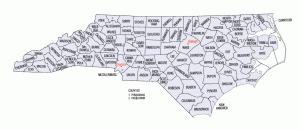North Carolina Tax
North Carolina State Tax
North Carolina Income Tax
 The North Carolina personal income tax system is fairly simple. North Carolina taxpayers pay personal income tax according to three progressive brackets: 6% for incomes up to $12,750, 7% for incomes up to $60,000, and 7.75% for incomes $60,001 and above. The progressive tax system has wider brackets that allow lower overall rates for joint filers. The maximum marginal income tax rate in North Carolina is the 11th highest in the United States.
The North Carolina personal income tax system is fairly simple. North Carolina taxpayers pay personal income tax according to three progressive brackets: 6% for incomes up to $12,750, 7% for incomes up to $60,000, and 7.75% for incomes $60,001 and above. The progressive tax system has wider brackets that allow lower overall rates for joint filers. The maximum marginal income tax rate in North Carolina is the 11th highest in the United States.
Companies incorporated in and out-of-state corporations that generate income in North Carolina are required to pay corporate income tax to the state. The corporate tax rate in North Carolina is 6.9% of the company’s annual gross income.
The basic state sales tax rate in North Carolina is 4.75%. However, total sales tax may go up to 7.25% depending on where you are in the state. Apart from the basic state sales tax, counties can collect up to 2.5% local sales tax on transactions made in their jurisdiction.
Unlike most states, groceries and non-prepared food are taxed in North Carolina- although at lower rates. Prescription drugs are exempted from tax, but prepared food is subject to higher sales tax. North Carolina is one of the states that observe state tax holidays during the back-to-school season.
The state tax system in North Carolina is regulated by the North Carolina Department of Revenue. The NCDR collects all taxes except property tax which is collected and used by local counties and municipalities to fund local government projects and operations. Proper tax collection is vital in sustaining state government operations.

